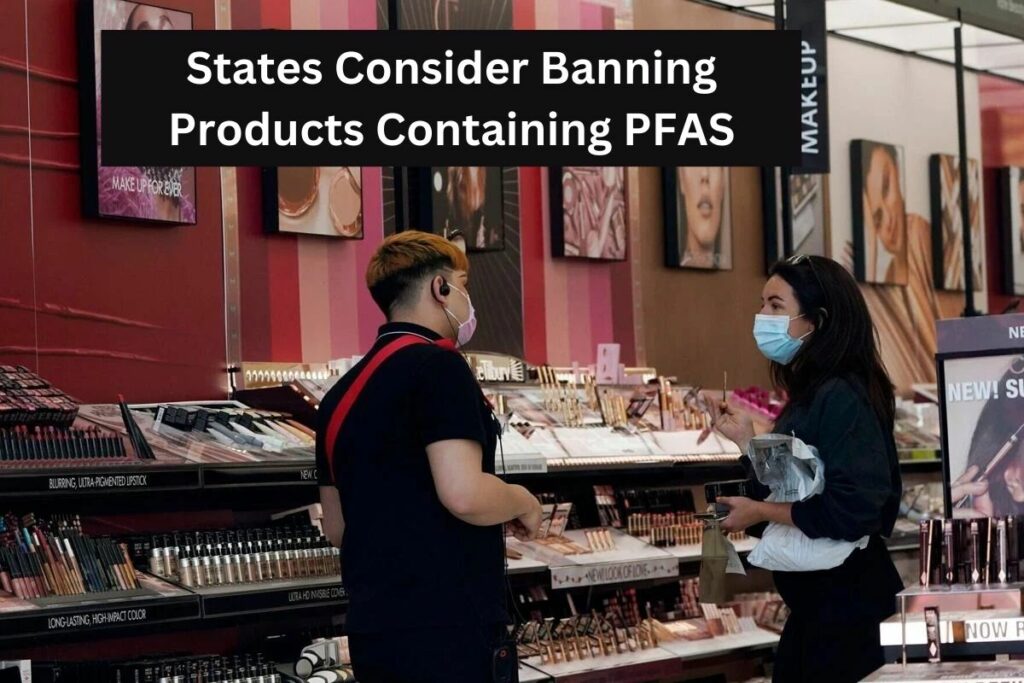Bans on cosmetics and other consumer goods containing the PFAS chemical family are being considered by an increasing number of state legislatures. This week, the Vermont state Senate granted its final approval to a bill that would ban the sale and distribution of menstruation products and cosmetics in the state that contain perfluoroalkyl and polyfluoroalkyl compounds, as well as a variety of other chemicals.
According to Republican state senator and chair of the Senate Committee on Health and Welfare Terry Williams, the products include shampoo, cosmetics, deodorant, sunscreen, hair colors, and more. Williams stated in presenting the bill to Senate colleagues that “several known harmful chemicals are used in or detected as contaminants in personal care items, including PFAS, lead, and formaldehyde.”
Similar restrictions on cosmetics were passed in California, Colorado, and Maryland and will take effect in 2025. Bills have also been introduced in Illinois, Rhode Island, and Georgia, and additional ideas are being considered in Washington and Oregon.

The U.S. Environmental Protection Agency reports that studies have connected PFAS exposure to increased cancer risk, developmental delays in children, harm to organs including the thyroid and liver, elevated cholesterol levels, and weakened immune systems, particularly in young children.
The proposed Vermont ban on PFAS, also known as “forever chemicals” because of their tenacity in the environment, goes beyond cosmetics, similar to the crackdowns in Colorado and California. The plan, which must now be reviewed by the Vermont House, would expand the ban to include textiles, including upholstery, draperies, towels, and bedding, as well as outdoor clothes for extremely wet circumstances, athletic turf, clothing, and ski wax.
It provides multiple phaseout timings. According to Lauren Hierl, executive director of Vermont Conservation Voters, “We must prohibit importing hazardous chemicals like PFAS into our state in order to prevent the harms they are producing up and down the supply chain – from their manufacturing and usage to their disposal.”
You can also see the most recent news below:
- BLACKPINK’s Jisoo Launches ‘ME’ Solo Album
- Covid News: The New York Mask Law Remains in Place After a Judge Issues a Stay
According to the Environmental Protection Agency, the protection will prevent major illnesses like cancer and thousands of deaths by setting the first federal restrictions on the contaminants in drinking water. Since the 1940s, the compounds have been utilized in industrial and consumer items like nonstick pans, food packaging, and firefighting foam.
In the United States, their use has since largely been phased out, but few still exist. There is also increasing pressure to get rid of PFAS from food packaging. More than half of the cosmetics sold in the United States and Canada contain a dangerous industrial ingredient linked to major health issues, according to a 2021 study by the University of Notre Dame researchers.
More than 230 regularly used cosmetics were evaluated by researchers, and they discovered fluorine—a sign of PFAS—in 56% of foundations and eye products, 48% of lip products, and 47% of mascaras. According to the U.S. Food and Drug Administration, there has been little research on the presence of PFAS in cosmetics, and the ones that have been published have found that the content is extremely low.
The Personal Care Products Council, which represents the cosmetics sector, claims that it supported Maryland legislation that was similar to California legislation in 2020 to phase out certain substances, including 13 PFAS in cosmetics. To eliminate uncertainty, the association urged governments to adopt standard laws.
See the latest news below:
The American Apparel & Footwear Association is in favor of prohibiting clothing containing the chemicals, and its director of sustainability, Chelsea Murtha, said in a statement that the organization appreciates the amendments made to the Vermont Senate’s unanimously passed legislation to make them more in line with the phase-out schedules for the PFAS restrictions already in place in California and New York.
The Outdoor Industries Association, based in Colorado, stated that it generally supports the Vermont legislation and added that the new version more closely resembles California’s deadline for compliance. As our business works aggressively to transition toward regrettable alternatives that will not compromise consumer safety or the quality of the product, we are grateful for the exception for outdoor gear in extreme wet weather until 2028, said President Kent Ebersole in a statement.
Stay Connected With newscatchy.com



